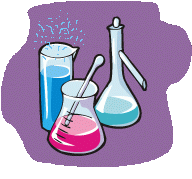


Experiments for 'copper'
Below follows a summary of all experiments, matching your search. Click one of the EXPERIMENT hyperlinks for a complete description of the experiment.
![]()
Results for 'copper':
EXPERIMENT 1
---------------
Copper is oxidized by a mix of concentrated hydrochloric acid and
hydrogen peroxide. When the peroxide is used up and there is still an
excess amount of hydrochloric acid, then the copper (II) appears to
oxidize the copper metal, under the formation of an intensely colored
complex. (What is the constitution of this complex??)
When the solution is diluted with water, then the intensely colored
complex is destroyed and a white crystalline precipitate of CuCl is
formed. If too much water is used, then no clear precipitate is formed.
EXPERIMENT 2
---------------
Copper (II) reacts with metallic copper, in the presence of a large amount
of hydrochloric acid, forming an intensely colored compound. This compound
contains copper (I). If copper (II) is used alone, with hydrochloric acid
and peroxide, then the strong coloration does not occur.
EXPERIMENT 3
---------------
When copper dissolves in aqua regia, then a colorless gas is produced.
Oxidation apparently proceeds in a different way, when compared with
dissolving copper in nitric acid.
EXPERIMENT 4
---------------
Cupric chloride forms a coordination complex when a large excess of chloride
is present and this chloro cuprate complex easily oxidizes metallic copper.
This oxidation causes formation of copper (I), which forms a very dark
brown complex in the presence of copper (II) and hydrochloric acid (what
is this dark brown compound?).
EXPERIMENT 5
---------------
Copper (II) forms a very dark coordination compound with concentrated
bromide in highly acidic environments. When metallic copper is added,
then this complex quickly disappears and the liquid almost becomes
colorless.
EXPERIMENT 6
---------------
Alkanes do not react strongly with NO2. Some NO2 dissolves in them.
EXPERIMENT 7
---------------
When concentrated sulphuric acid is added to concentrated nitric acid,
then some heating can be observed.
The mixed acid reacts with tissue, but not as strongly as pure sulphuric
acid does. The mixed acid reacts with copper, but this reaction is not
as strong as the reaction with nitric acid only.
With citric acid and acetone no strong reaction occurs.
EXPERIMENT 8
---------------
Methylene chloride is capable of extracting nitric acid from its aqueous
solution.
End of results for 'copper'
![]()